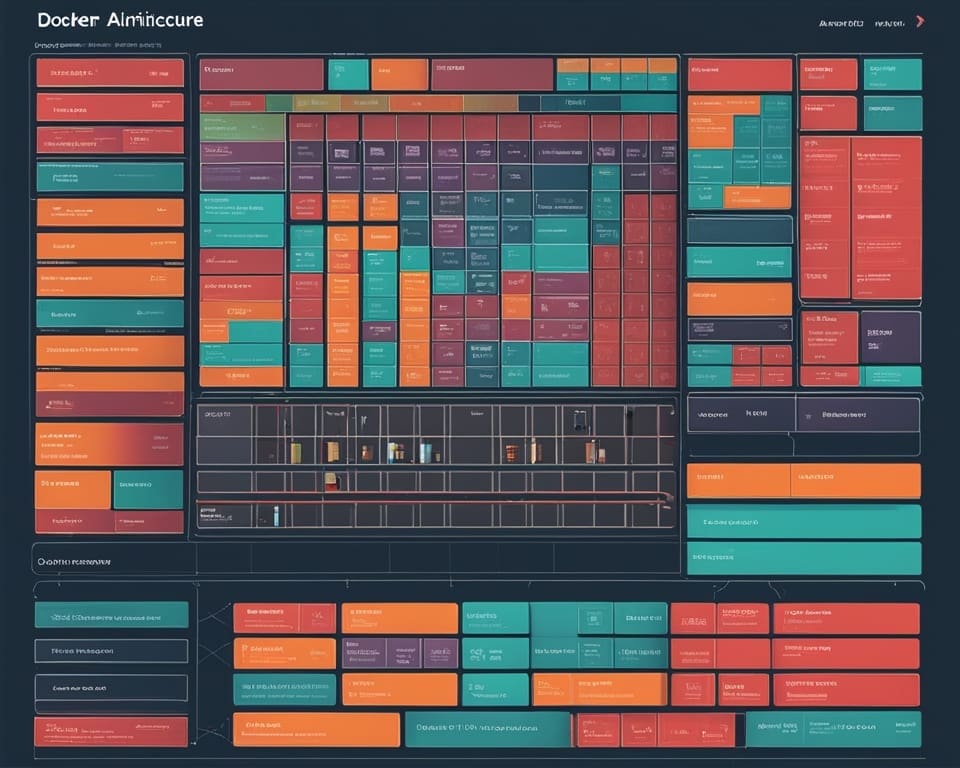In today’s tech world, developers look for ways to work smarter and faster. Docker is key, helping pack everything an app needs into Docker containers. It makes things consistent and speeds up getting apps out there.
We’ll show how Docker makes projects better. By using containers, your workflow gets a big boost. This leads to more solid app making. We’ll talk about how to make app development with Docker smoother, improve team work, and avoid deployment issues.
Let’s discover how containerization for app development changes things. It’s about doing more, faster, and using less resources in your projects.
Understanding Docker and Its Core Components
Docker marks a big leap in making app development smoother. It offers features that boost both performance and efficiency. Its core parts act as the foundation for efficiently creating and handling applications. Grasping these elements is key to using Docker effectively in today’s development settings.
What is Docker?
Docker is a cutting-edge platform that helps developers quickly build, run, and deliver applications through containerisation. It wraps up an app’s whole runtime environment, including all needs, binaries, and configs. This approach saves time and ensures consistency everywhere. Docker containers make sure apps work the same, from a personal computer to large data centres.
Containers vs Virtual Machines
Understanding the difference between containers and virtual machines is pivotal for grasping Docker’s efficiency. Containers don’t need their own OS; they share the host’s system kernel. This results in faster starts and less resource use, leading to better performance. Docker’s lightweight containers let developers run many instances on a single host without losing speed.
Docker Architecture
Docker’s design is based on a client-server model which is vital for its functioning. The Docker client communicates with the Docker daemon to oversee container tasks. This process allows for seamless execution of actions like creating, running, and spreading Docker images. It uses Linux kernel’s features for resource isolation and limit access, which boosts security in setups with many containers.

How to Use Docker for Streamlining App Development
Docker changes how we develop apps by making configuration and environment management easy. It allows developers to work more efficiently. This ensures consistent quality across the whole app development phase.
Setting Up Your Development Environment
First, you need to install Docker on different operating systems like Windows, macOS, and Linux. This creates an environment similar to the final product. It reduces issues caused by differences between computers. After installing, Docker Desktop helps manage your containers smoothly.
Creating and Managing Docker Containers
Docker’s strength is in handling containers. Using docker run starts containers, and docker build creates Docker images from Dockerfiles. This guarantees that each app works in the right setting. It’s important to keep images small and use multi-stage builds for the best outcome.
For complex apps, Docker automation is very helpful. Docker Compose allows the easy handling of multiple containers. You define services in a YAML file, making scaling up simple. This boosts the development speed and makes deploying apps more reliable.
Best Practices for Docker Deployment in App Development
To get the best out of Docker deployment, embrace some top practices. It’s important to use a good Docker image management tips. This includes having a smart tagging plan to manage versions well. Docker Hub helps in sharing and updating images effectively. It improves teamwork by making workflow easier.
Choose small base images, like Alpine, to keep Docker images light. Alpine images are less than 6 MB but work like full Linux distros. Regular updates of these images keep your system secure and fast.
Having a consistent build process helps with smooth automation. This is crucial for fast app deployment and avoiding differences between dev and production. Docker Compose is a great tool for controlling many containers at once. It makes development and deployment smooth and easy.
It’s vital to understand Docker networking to build scalable systems. Docker lets you scale your app up or down easily. This flexibility, plus the cost savings and better teamwork Docker offers, helps in building strong, portable apps. It makes maintaining apps easier across their lifecycle.








